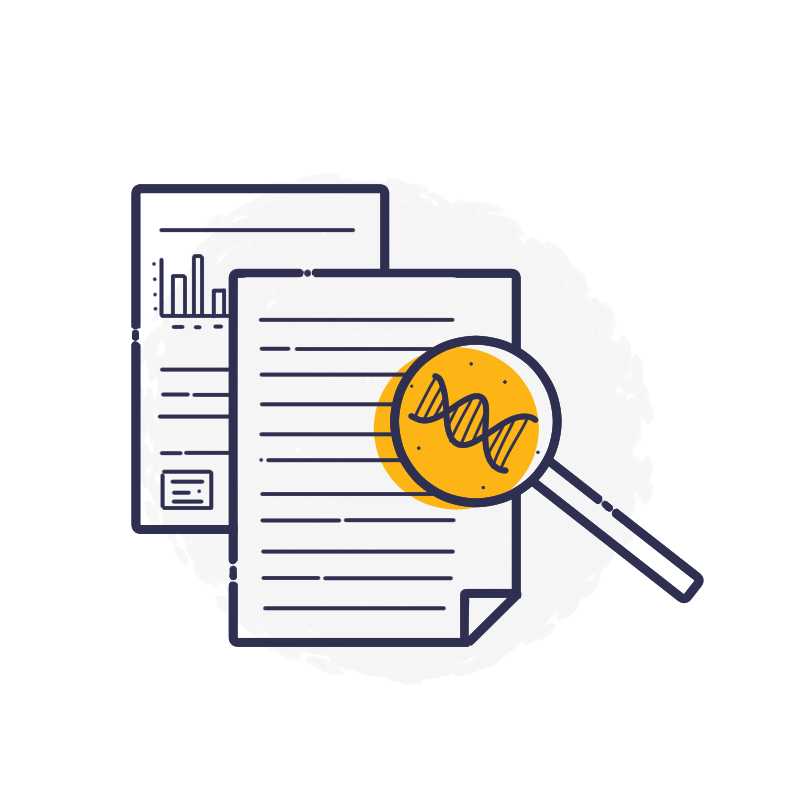This information is designed to give General Practitioners (GPs) and other healthcare professionals some important tools to assist your NF patients to access the support they need.

DIAGNOSTIC CRITERIA
Neurofibromatosis Type 1 (NF1)
A diagnosis of NF1 is usually made clinically through medical examination of the body as this is considered most reliable. However, more and more frequently diagnosis is made through a blood test in which the NF1 gene is analysed for changes (for more information head to What causes NF?)
To receive a clinical diagnosis of NF1 an individual must have at least two of the following diagnostic criteria:
- A parent with NF1 based on diagnostic criteria.
- 6 or more Café-au-lait marks (CALs) which are 5 mm or larger in pre-pubertal children, or 15 mm or larger for anyone who has passed through puberty.

- Freckling under the arms (axillary) or in the groin area (inguinal)

- Presence of two or more neurofibromas of any type or one or more plexiform neurofibromas.

- Two or more iris Lisch nodules identified by slit lamp examination or two or more choroidal abnormalities (CAs)—defined as bright, patchy nodules imaged by optical coherence tomography (OCT)/near-infrared reflectance (NIR) imaging.

- A distinctive osseous lesion such as sphenoid dysplasia, anterolateral bowing of the tibia, or pseudarthrosis of a long bone.

- Optic Pathway Glioma (OPG).

Neurofibromatosis Type 2 (NF2)
There are two sets of clinical diagnostic criteria for NF2. These were created by the National Institute of Health (NIH) Consensus and the second by the Manchester group.
The NIH guidelines require you to have:

The Manchester guidelines take into account not having a family history of the condition:

 Bilateral Vestibular Schwannoma
Bilateral Vestibular Schwannoma
Schwannomatosis
Schwannomatosis is more complicated than the other forms of NF and so it follows that diagnosis is not so easy either.
The diagnostic criteria for this condition is still open for discussion, however, suggested guidelines were put forward in 2005. This condition is generally diagnosed clinically as the genetic basis for the condition remains somewhat uncertain.
To receive a diagnosis of Schwannomatosis someone must be over 30 years of age and meet one of the two criteria paths below:

Discussions have revealed that perhaps these criteria are not quite adequate and so the below has also been proposed as additional diagnostic criteria:

Check out the Understanding NF section of the website for more information on the signs, symptoms and treatments.

RESOURCES FOR HEALTHCARE PROFESSIONALS
Some Australian resources have been developed to assist in managing patients with these conditions. We would also encourage referrals through to the CTF, which can be forwarded to support@ctf.org.au
DOWNLOAD REFERRAL TEMPLATE HERE
You may find the links below useful:
NF1
Neurofibromatosis-associated tumours of childhood in the molecular era
Nagabushan, Medicus, 2021
How To Treat – Neurofibromatosis Type 1 2019
Higgins et al., ausdoc.com.au, 2018
NF1 Genetic testing
NSW Government/EviQ, 2020
Facts for people and families with Neurofibromatosis Type 1
NSW Government/EviQ, 2020
Neurofibromatosis Type 1 Best Practice Guidelines
Evans, BMJ Best Practice, 2020
Care of Adults with Neurofibromatosis Type 1: A Clinical Practice Resource of the American College of Medical Genetics and Genomics
Stewart et al., AMCG Practice Guidelines, 2018
Health Supervision for Children with Neurofibromatosis Type 1
Miller et al., American Academy of Pediatrics, 2019
Neurofibromatosis Type 1 - Risk Management
EviQ, 2019
NF2
Neurofibromatosis-associated tumours of childhood in the molecular era
Nagabushan, Medicus, 2021
NF2 Genetic testing
EviQ, 2018
EviQ: Neurofibromatosis Type 2 - Risk Management
EviQ, 2018
Cancer and Central Nervous System Tumor Surveillance in Pediatric Neurofibromatosis 2 and Related Disorders
Evans et al., American Assoc. for Cancer Research, 2017
Consensus Recommendations for Current Treatments and Accelerating Clinical Trials for Patients with Neurofibromatosis Type 2
Blakeley et al., American Journal of Clinical Genetics Part A, 2012
Neurofibromatosis Type 2 (NF2); A Clinical and Molecular Review
Evans, Orphanet Journal of Rare Diseases, 2009

NF CLINICAL SYMPOSIUM
2023 NF CLINICAL SYMPOSIUM
The Australian NF Clinical Symposium was held on Friday 28 July 2023
The event brings together health professionals and researchers (hybrid and virtual) to network and discuss the latest in medical management, treatment and research into neurofibromatosis in Australia and around the globe.
LEARN MORE
PREVIOUS SYMPOSIUMS
In August 2022, over 100 of Australia’s leading NF researchers and clinicians came together to enhance their knowledge of the condition.
The International Keynote Speaker was Professor D. Gareth Evans from Manchester University Hospital. The Symposium was attended by medical specialists, geneticists, researchers, paediatricians and allied health professionals.

If you would like any additional information on any of these presentations, please contact the Support Team on 02 9713 6111.